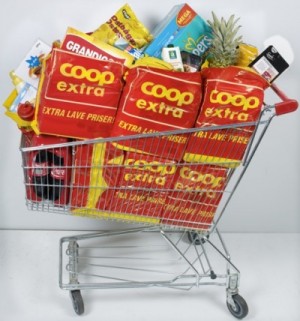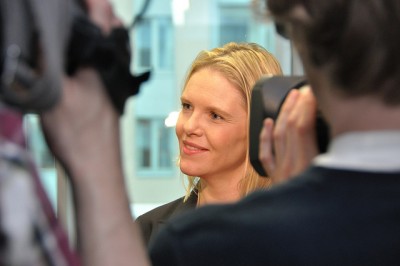A carton of eggs was priced at NOK 49.90 (USD 6.10) this week at one of the large stores in Oslo run by ICA, soon to be taken over by the competing Coop chain. Food prices in general have risen nearly 6 percent just since last spring, according to new figures from state statistics bureau SSB, and the ongoing consolidation of Norway’s dominant wholesalers and retailers raises fears that prices will continue to rise.

The retailers’ trade association Virke, which represents some of the major grocery store owners, blames much of the rise on the weaker Norwegian currency, the krone. “We’re not surprised,” Johanne Kjuus of Virke, told news bureau NTB on Tuesday. “The krone’s exchange rate contributes to how imported food and drink has become more expensive.”
That doesn’t explain, though, why ICA was charging NOK 49.90 for the same Prior brand of a dozen eggs that cost NOK 41.90 earlier this summer. The price spotted by newsinenglish.no on Monday of this week amounts to a price increase of 20 percent for eggs that are protected by Norway’s agricultural policies and certainly not imported. The same eggs were selling for NOK 38.90 at a KIWI grocery store a few blocks away, raising questions as to whether ICA is simply trying to take as much money as it can before it runs. It was also selling Norway’s heavily protected milk for NOK 16.80, up from prices of around NOK 15 in June.
The big price difference involving eggs doesn’t mean KIWI’s owner, Norway’s biggest wholesaler and retailer NorgesGruppen, is being charitable or that consumers should run their way. In their produce department, the price of celery jumped from NOK 14.90 last week (when celery imported from Spain was still on the shelves) to NOK 26.90, when Norwegian farmers’ celery hit the market. That amounted to an 80 percent increase that KIWI also applied to some of the older Spanish celery still hanging around. It didn’t take much imagination to figure out who might be pocketing that huge increase in price, for consumers willing to pay it.
Grocery price hikes far outpace annual inflation rate
SSB (Statistics Norway) reported that the average price of food and non-alcoholic beverages in Norway rose NOK 1.9 percent just from June to July. All types of food rose in price, with meat (also protected by Norway’s import tariffs) rising the most, by 2.6 percent on a month-to-month basis. By contrast, Norway’s annual inflation rate was set at 2.6 percent over the past year.
SSB noted that at least some of the grocery price rise was tied to the results of the state government’s agreement with farmers last spring that took effect from July 1. Non-alcoholic drink prices, meanwhile, are up 5.8 percent since last summer.
Virke is correct in stating that imported items have seen the biggest price increases, up 12.7 percent, which it blames on the weaker krone. Many of the imports are controlled and distributed, however, by a few dominant wholesalers like NorgesGruppen, which also owns several of the main grocery store chains in Norway including Meny, Jacobs, Spar, Joker and Kiwi. For years, though, they’ve dodged claims that they use their muscle to control the market regarding product selection and prices at both the wholesale and retail level. Prices at grocery stores in Sweden are as much as 40 percent lower on all kinds of items, for example imported Ocean Spray cranberry juice. It costs around NOK 40 at Norwegian stores where it’s available, compared to SEK 19.80 at a variety of stores in Sweden.

All this, not least the increase in food prices in a year when farmers received a relatively small subsidy offer from the state, has sparked more reaction and indignation from Agriculture Minister Sylvi Listhaug of the conservative Progress Party. “I think the price rise has been high in recent months, seen as a whole,” she wrote in an email when questioned by newspaper Aftenposten. “A weaker Norwegian krone can explain some of that, but there is all reason for consumers to follow the prices closely, so the big chains don’t enrich themselves on this at others’ expense.” The families controlling the chains regularly appear on lists of the wealthiest Norwegians.
After another major price rise last summer, Listhaug has been following the grocery business closely and claims to be working intensely on a proposed new law about grocery store ethics. Debate has raged for years, and in other former governments, over who and what is responsible for Norway’s notoriously high prices. It’s most likely a combination of the government policy that protects Norwegian farmers from foreign competition and subsidizes their income, the high costs of doing business in Norway in general, Norway’s 15 percent value-added tax on food, the relatively few wholesalers and retailers that arguably control the market and passive Norwegian consumers. Since many Norwegians spend a lower share of their monthly income on food, compared with consumers in many other countries, they don’t complain vocally but often with their feet, by heading over the border to shop in Sweden.
The threat of the Big Three
When Sweden-based ICA and its Rimi chain of stores withdraw from Norway, because they weren’t making enough money, three major retailers will be left to control more than 90 percent of the Norwegian market: NorgesGruppen with around 40 percent, Coop with around 30 percent and REMA 1000 with around 24 percent. Listhaug insists she’s monitoring the situation that looms later this year when the three grocery giants take over ICA’s and Rimi’s stores.
“We have high food prices in Norway and therefore the government is examining all links in the value chain, to see where competition can be strengthened,” Listhaug said. Some of her predecessors have done the same, without any noticeable changes being made. “With only three major grocery store operators there is all reason to follow competition closely,” Listhaug continued. “In addition we have strong concentration at the wholesale and distribution end.” NorgesGruppen’s Asko is the country’s largest supplier of food to grocery stores, hotels, restaurants and kiosks.
Listhaug was criticized on Tuesday, though, for not working faster to determine why prices are so much higher and selection so much poorer than it is, for example, in neighbouring Sweden, a country also known for historically high prices. “Concentration in the grocery store business is a steadily increasing challenge for both consumers and for suppliers to the chains,” said Petter Brubakk, director of business policy for national employers’ organization NHO. “Concentration has increased over the last year, with ICA being phased out as an independent chain.” Suppliers have been pushed out of some of the big chains or forced to pay huge fees for the best shelf space. That’s the sort of thing that’s set off the calls for some form of regulation.
Brubakk claimed it’s important that the long-proposed law on trade ethics that’s gone through the hearing process be imposed quickly to regulate the grocery business, adding that NHO was “getting impatient.” Listhaug wouldn’t comment further on how she intends to address Norway’s high grocery prices, other than claiming that her ministry was working on it, and the law.
newsinenglish.no/Nina Berglund

